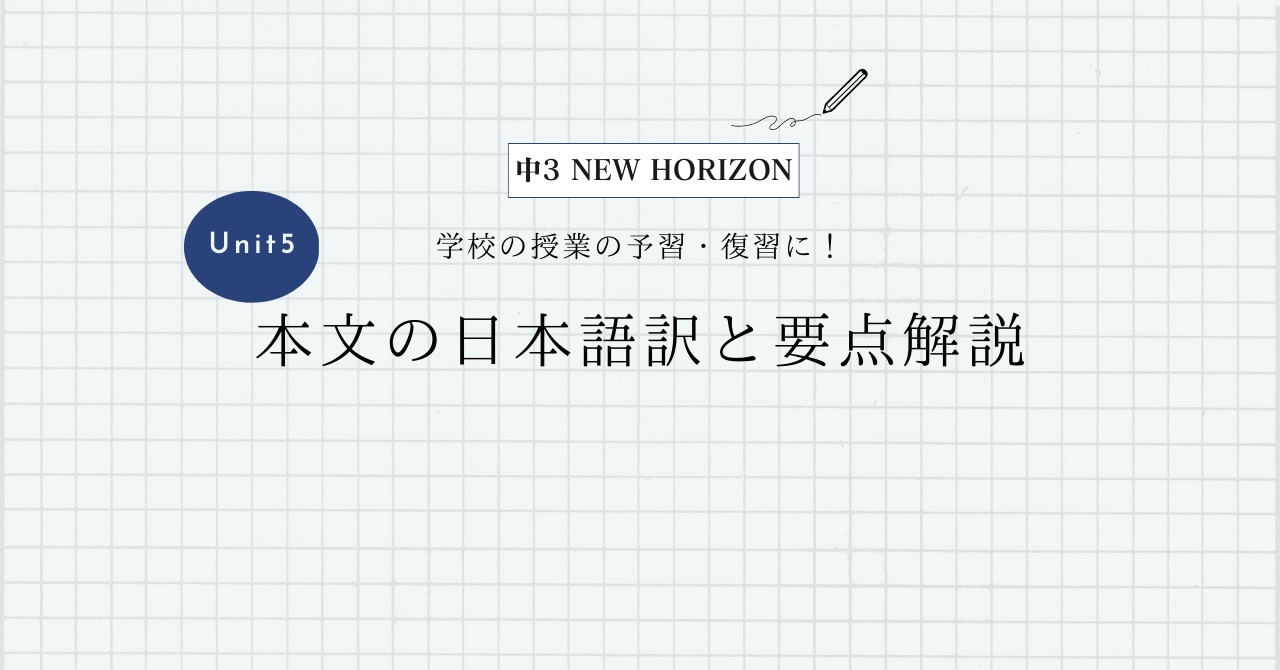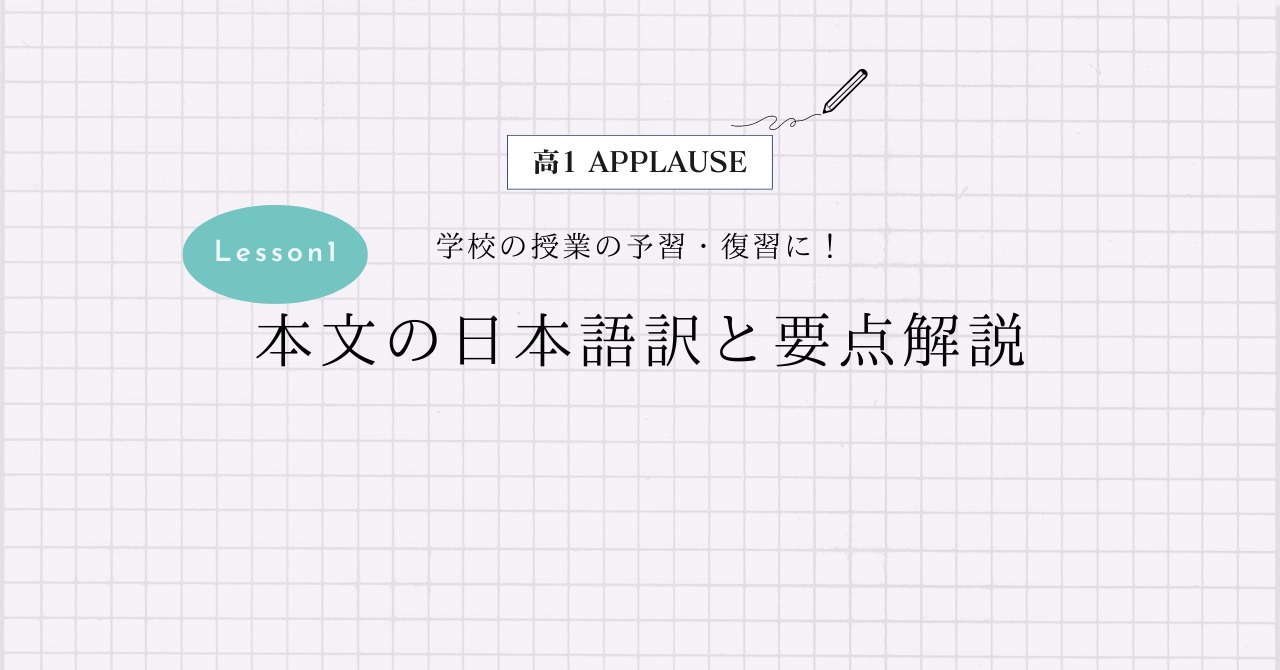東京書籍 中学3年生 NEW HORIZON(ニューホライズン) Unit5 Read & Think1の本文の日本語訳と重要箇所の解説です。
Unit5-1, 5-2の解説はこちらからご覧ください。
>中3NEW HORIZON Unit5 Scene1 本文和訳
>中3NEW HORIZON Unit5 Scene2 本文和訳
- Unit5 Read & Think1 本文と日本語訳
- Unit5 Read & Think1 重要事項の解説
- What is the main idea of Gandhi’s movements?
- Gandhi moved to South Africa to work as a lawyer in 1893.
- It was under British rule at that time and there was a lot of discrimination.
- For example, Indians could not go out at night freely or walk on the sidewalk.
- There were also hotels that did not accept Indian guests.
- In 1906, the British made a law that was even more unfair to Indian people.
- Indians in South Africa got angry and stood up against the law.
- Gandhi decided to lead a movement to protect their rights.
- His message was “Don’t follow the law, but don’t use violence, even if you are arrested.”
- Soon the jails became full of Indians, and Gandhi himself was sent there.
- Finally, in 1914, after many years and much effort, the law was removed.
- It showed that non-violent movements can be effective.
- Gandhi returned to India in 1915. India was also a British colony.
- In those days, there was a law that the British made for salt.
- According to the law, only the British could produce or sell salt.
- They put a heavy tax on it.
- The Indians were very poor, but they had to buy expensive salt.
- The money went to the British. Gandhi thought it was unfair.
- In 1930, Gandhi decided to walk to the sea and make salt himself.
- He started with 78 followers.
- Thousands of people joined him on the way.
- After walking almost 400 kilometers, he reached the sea.
- This non-violent march was called the Salt March.
- News of the march spread around the world.
- It showed people a new way to fight against discrimination.
- Gandhi’s peaceful fight continued after that.
- In 1947, India won independence.
- Non-violent protest is the legacy that Gandhi left.
- It has influenced famous leaders, such as Martin Luther King, Jr. and Nelson Mandela.
- Unit5 Read & Think1 まとめ
Unit5 Read & Think1 本文と日本語訳
What is the main idea of Gandhi’s movements?
「ガンディーの運動の主な考えは何ですか?」
Gandhi moved to South Africa to work as a lawyer in 1893.
「ガンディーは弁護士として働くために1893年に南アフリカに引っ越しました。」
It was under British rule at that time and there was a lot of discrimination.
「そこは当時イギリスに支配されていて,たくさんの差別がありました。」
For example, Indians could not go out at night freely or walk on the sidewalk.
「例えば,インド人は夜に自由に外出したり,歩道を歩くことができませんでした。」
There were also hotels that did not accept Indian guests.
「また,インド人の客を受け入れないホテルもありました。」
In 1906, the British made a law that was even more unfair to Indian people.
「1906年に,イギリス人はインド人にとってより一層不公平な法律を作りました。」
Indians in South Africa got angry and stood up against the law.
「南アフリカのインド人は怒り,その法律に反対して立ち上がりました。」
Gandhi decided to lead a movement to protect their rights.
「ガンディーは彼らの権利を守るために,運動を率いることを決めました。」
His message was “Don’t follow the law, but don’t use violence, even if you are arrested.”
「彼のメッセージは,『法には従わないこと。しかし,たとえもし逮捕されたとしても暴力は振るわないこと。』というものでした。」
Soon the jails became full of Indians, and Gandhi himself was sent there.
「すぐに刑務所はインド人でいっぱいになり,ガンディー自身もそこに送られました。」
Finally, in 1914, after many years and much effort, the law was removed.
「ついに1914年に,長年の多大な努力を経て,その法律は廃止されました。」
It showed that non-violent movements can be effective.
「そのことは非暴力の運動が効果的であることを示していました。」
Gandhi returned to India in 1915. India was also a British colony.
「ガンディーは1915年にインドに戻りました。インドもイギリスの植民地でした。」
In those days, there was a law that the British made for salt.
「当時は,イギリスが作った塩に関する法律がありました。」
According to the law, only the British could produce or sell salt.
「その法律では,イギリス人だけが塩を生産し売ることができました。」
They put a heavy tax on it.
「彼らは塩に重税をかけました。」
The Indians were very poor, but they had to buy expensive salt.
「インド人はとても貧しかったのですが,高い塩を買わなければなりませんでした。」
The money went to the British. Gandhi thought it was unfair.
「そのお金はイギリス人に渡りました。ガンディーはそれは不公平だと思いました。」
In 1930, Gandhi decided to walk to the sea and make salt himself.
「1930年,ガンディーは海まで歩いて自分で塩を作ることを決めました。」
He started with 78 followers.
「彼は78人の支持者と一緒に始めました。」
Thousands of people joined him on the way.
「数千もの人々が途中で彼のもとに加わりました。」
After walking almost 400 kilometers, he reached the sea.
「およそ400キロを歩いた後,彼は海に辿り着きました。」
This non-violent march was called the Salt March.
「この非暴力の行進は塩の行進と呼ばれました。」
News of the march spread around the world.
「その行進のニュースは世界中に広がりました。」
It showed people a new way to fight against discrimination.
「そのことは人々に差別に対して戦う方法を示しました。」
Gandhi’s peaceful fight continued after that.
「ガンディーの平和な戦いはその後も続きました。」
In 1947, India won independence.
「1947年に,インドは独立を勝ち取りました。」
Non-violent protest is the legacy that Gandhi left.
「非暴力の抗議はガンディーが残した遺産です。」
It has influenced famous leaders, such as Martin Luther King, Jr. and Nelson Mandela.
「それはマーティン・ルーサー・キング・ジュニアやネルソン・マンデラといった有名な指導者に影響を与えています。」

Unit5 Read & Think1 重要事項の解説
What is the main idea of Gandhi’s movements?
“main”は「主な」という形容詞になります。“idea”は「考え,アイディア」という名詞ですね。
“movement“は「運動,活動」という名詞です。
Gandhi moved to South Africa to work as a lawyer in 1893.
“move”は「動く,引っ越す」という動詞ですね。
“to work”は「不定詞の副詞的用法」になっていますよ。
“as”は「~として」という前置詞で,“lawyer”は「弁護士」という名詞です。
It was under British rule at that time and there was a lot of discrimination.
“It”は“South Africa”を指しています。
“under ~ rule”で「~の支配下で」,“at that time”は「その時」という意味になります。
また,「there構文」も使われていますね。“discrimination”は「差別」という不可算名詞(数えられない名詞)です。
For example, Indians could not go out at night freely or walk on the sidewalk.
“for example”は「例えば」という重要表現です。
“Indian”は「インド人」で,“go out”は「外出する」という表現になります。
“freely”は「自由に」という副詞で,“sidewalk”は「歩道」という名詞ですね。
There were also hotels that did not accept Indian guests.
この文でも「there構文」が使われていますね。
また,「主格の関係代名詞that」も使われていて,“did not accept Indian guests”が“hotels”を修飾しています。
“also”は「また,さらに」といった副詞で,付け加える役割があります。色々な文で使うので必ず覚えましょう!
“accept”は「を受け入れる」という動詞で,“guest”は「客」という名詞です。
In 1906, the British made a law that was even more unfair to Indian people.
この文でも「主格の関係代名詞that」も使われていて,“was even more unfair to Indian people”が“a law”を修飾しています。
“law”は「法律」という名詞で,“unfair”は「不公平な」という形容詞になります。
“even”は「~さえ」という強調を表す副詞で,“even more”は「より一層」といった意味合いですね。
Indians in South Africa got angry and stood up against the law.
“get 形容詞”で「~になる」という意味になります。“angry”は「怒った」という形容詞です。
“stand up”は「立ち上がる」で,“against”は「~に反対して」という前置詞になります。
Gandhi decided to lead a movement to protect their rights.
“decide to 動詞の原形”は「~することを決める」という重要表現です。
“lead”は「を導く,率いる」という動詞になります。
“protect”は「を守る」という動詞で,”to protect”は「不定詞の副詞的用法」になっていますよ。
“right”は今回は名詞で「権利」という意味です。色々な意味があるので,それぞれしっかり覚えましょう。
His message was “Don’t follow the law, but don’t use violence, even if you are arrested.”
まず引用部分は「否定の命令文」になっていますね。
“follow”は「に従う,に付いていく」という動詞,“violence”は「暴力」という名詞で,“use violence”は「暴力を振るう」という意味です。
“even if~”は「たとえもし~だとしても」という表現になります。
“arrest”は「を逮捕する」という動詞で,ここでは「受動態」で使われていますね。
Soon the jails became full of Indians, and Gandhi himself was sent there.
“soon”は「すぐに」という副詞で,“jail”は「刑務所」という名詞です。
“be(become) full of~”で「~でいっぱいになる」という重要表現です。必ず覚えておきましょう!
“himself”などの“~self”という単語は再帰代名詞と言い,単語の直後に置くことで強調する役割があります。今回は“Gandhi”が強調されて「ガンディー自身」ということです。
“sent”は“send(を送る)”の過去分詞形で,「受動態」になっていますね。
Finally, in 1914, after many years and much effort, the law was removed.
“finally”は「ついに,最終的に」という副詞です。
“after”は「~の後」という前置詞で,“effort”が「努力」という不可算名詞(数えられない名詞)になります。
“many”と”much”はどちらも「たくさんの」という形容詞ですが,”many”は後ろに可算名詞(数えられる名詞)が,”much”は後ろに不可算名詞が来ます。
“remove”は「を取り除く,除去する」という動詞です。今回は「廃止する」と訳しました。そしてここでは「受動態」で使われていますね。
It showed that non-violent movements can be effective.
“It”は直前の文全体を指しています。
“show”は「を示す」という動詞で,「接続詞that」によって文が繋げられていますね。
“violent”は「暴力的な」という形容詞で,“non-violent”は「非暴力の」という意味です。
“can”は助動詞で「~だろう」という可能性の意味で使われています。“effective”は「効果的な」という形容詞になります。
Gandhi returned to India in 1915. India was also a British colony.
“return”は「戻る,を返す」という動詞です。
“British”は「イギリスの」という形容詞,“colony”は「植民地」という名詞ですね。
In those days, there was a law that the British made for salt.
“in those days”は「その当時は」という表現になります。
また,この文でも「there構文」と「目的格の関係代名詞that」が使われていますね。
“the British made”が“a law”を修飾しています。“salt”は「塩」です。
この文の“British”は「イギリス人」という名詞ですね。
According to the law, only the British could produce or sell salt.
“according to~”は「~によると」という重要表現です。
“only”は「~だけ」という強調を表す副詞で,“produce”は「を生産する」,“sell”は「を売る」という動詞になります。
They put a heavy tax on it.
“put tax on~”で「~に税を課す」という意味になります。
“heavy”は「重い」という形容詞で,“tax”が「税」という名詞ですね。
“it”は“salt”を指しています。
The Indians were very poor, but they had to buy expensive salt.
“poor”は「貧しい」という形容詞です。
“had to 動詞の原形”は“have to”の過去形で「~しなければならなかった」となります。
“expensive”は「(値段が)高い」という形容詞ですね。
The money went to the British. Gandhi thought it was unfair.
“went to”はここでは「渡った」と訳しました。
“thought”の後ろには「接続詞that」が省略されていますね。
“it”は直前の文全体を指しています。
In 1930, Gandhi decided to walk to the sea and make salt himself.
“himself”などの“~self”という単語は再帰代名詞と言い,単語の直後に置くことで強調する役割があります。
また,文頭や文末に置くことで強調する意味合いもあります。“himself”は「彼自身で」という意味ですね。
He started with 78 followers.
“with”は前置詞で今回のように「~と一緒に」と訳すことが多いですが,必ずしも後ろに人が来るわけではありません。イメージとして「~とセットで」と覚えておきましょう。
訳し方としては「~を使って」「~で」など文脈に合わせて柔軟に変えてあげましょう。
“follower”は「支持者」という名詞です。
Thousands of people joined him on the way.
“thousand”は「千(の)」で,“thousands of~”で「数千もの~」といった意味になります。
“join”は「に参加する,加わる」という動詞です。
“on the way”は「途中で」という重要表現ですよ。
After walking almost 400 kilometers, he reached the sea.
“after”は「~の後」という前置詞なので,“walking”が「動名詞」になっていますね。
“almost”は「ほとんど,およそ」という副詞になります。
“reach”は「に到着する,辿り着く」という動詞です。
This non-violent march was called the Salt March.
“march”は「行進」という名詞です。
この文は「受動態」になっていますね。
News of the march spread around the world.
“of”は前置詞で,”A of B”の形で「BのA」というように後ろから前に訳します。
“spread”は「が広がる,を広める」という動詞で,過去形も過去分詞形も同じ形になります。
“around the world”は「世界中で」という意味で,“all over the world”も同じ意味になりますね。
It showed people a new way to fight against discrimination.
“It”は直前の文全体を指しています。
また,“showed”の後ろには「接続詞that」が省略されていますね。
“way”は「道,方法」という名詞で“fight”は「戦う」という動詞です。
そして“to fight”は「不定詞の形容詞的用法」になっていて,直前の“way”を修飾していますよ。
Gandhi’s peaceful fight continued after that.
“peaceful”は「平和な」という形容詞で,“fight”はここでは「戦い」という名詞の意味です。
“continue”は「続く」という動詞ですね。
“after that”は「その後も」くらいで訳せばOKです。
In 1947, India won independence.
“won”は“win”の過去形で,「勝った,勝ち取った」という意味になります。発音は「ワン」なので要注意ですよ!
“independence“は「独立」という名詞ですね。
Non-violent protest is the legacy that Gandhi left.
“protest”は「抗議」,“legacy”は「遺産」という名詞です。
また,「目的格の関係代名詞that」も使われていて,“Gandhi left”が“the legacy”を修飾しています。
“left”は“leave”の過去形で「出発する,去る」といった,「ある場所から離れる」というイメージを持つ動詞です。訳は文章に応じて柔軟に変えてあげましょう。
また,「を置き忘れる,残す,ままにする」といった意味もありますよ!
今回は「残す」で訳してあげます。
It has influenced famous leaders, such as Martin Luther King, Jr. and Nelson Mandela.
“It”は“Non-violent protest”を指していますね。
“has influened”は「現在完了の継続用法」になっていて,“influence”は「に影響を与える」という動詞です。
“famous”は「有名な」という形容詞で,“leader”は「指導者」という名詞です。
“such as~”は「~のような,例えば~」という重要表現です。
Unit5 Read & Think1 まとめ
以上がUnit5 Read & Think1の日本語訳となります。
ここでは「受動態」や「関係代名詞」が使われていますね。しっかり理解していきましょう!
>中3NEW HORIZON Unit5 Scene1 本文和訳
>中3NEW HORIZON Unit5 Scene2 本文和訳
何か分からない点や他に解説してほしい点があれば,お気軽にコメントしてください!




コメント